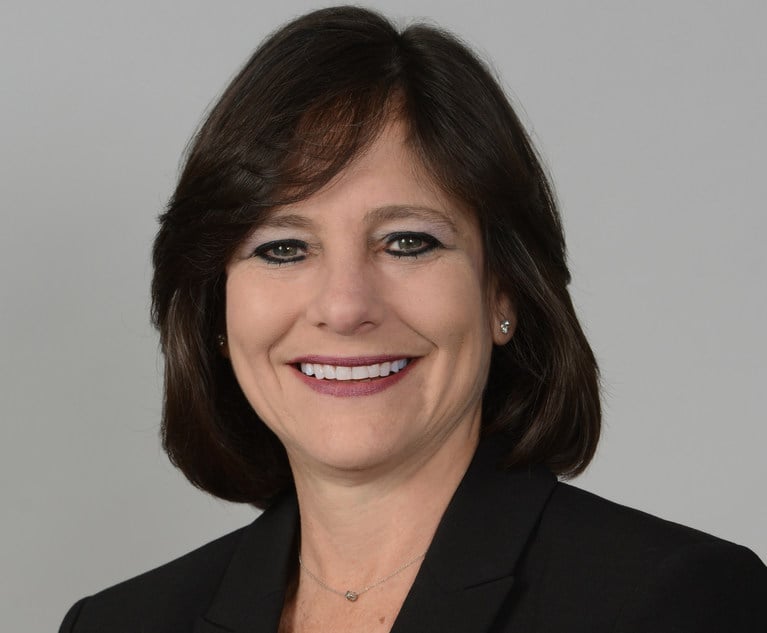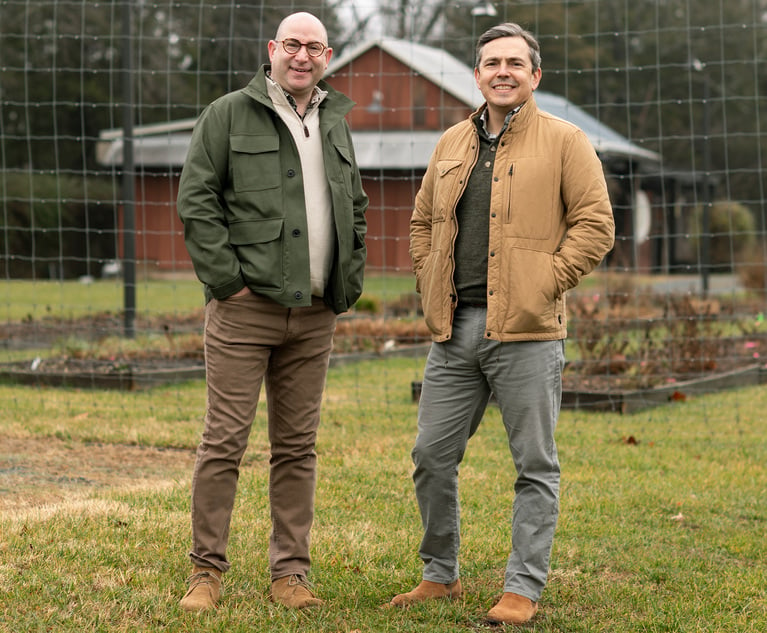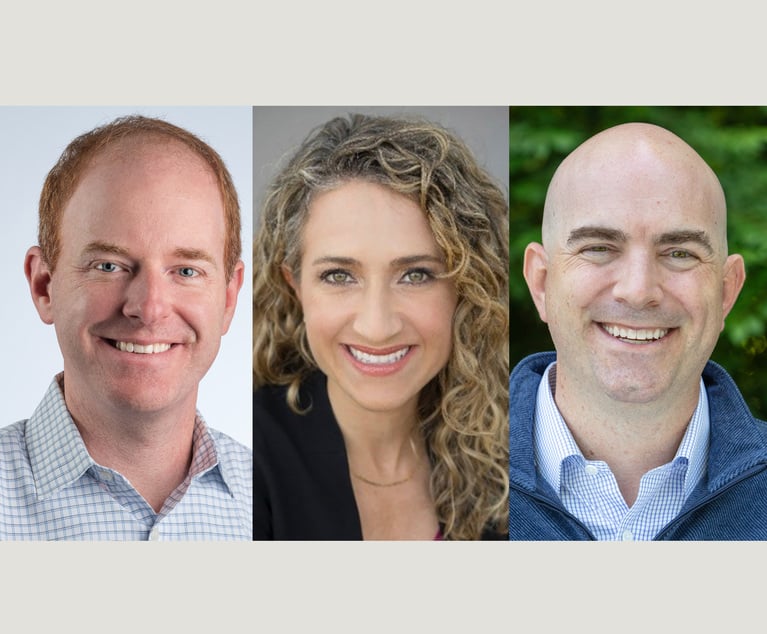 (L to R) James Hurst and Andrew Kassof Kirkland & Ellis (Photo: Todd Winters/Courtesy Photo)
(L to R) James Hurst and Andrew Kassof Kirkland & Ellis (Photo: Todd Winters/Courtesy Photo)Daily Dicta: Kirkland Crosses the 'V' With New Push for Plaintiffs-Side Contingency Cases
Kirkland & Ellis is launching a plaintiffs-side trial group with the aim of dramatically increasing the number of commercial disputes it handles on a contingency fee basis.
July 10, 2019 at 01:59 PM
4 minute read
“We're betting on ourselves now … truly doubling down.”
That's how Kirkland & Ellis partner James Hurst describes a new move by the litigation powerhouse to dramatically expand its caseload representing plaintiffs on a contingency fee basis.
On Wednesday, the firm announced it's launching a plaintiffs-side trial group, aiming to “increase by ten-fold or more the number of contingency cases we're taking on,” Hurst said.
No, not the 'Have-you-been-injured-in-a-motorcycle-crash-our-operators-are-standing-by' variety. Nor will Kirkland litigators be bringing class actions or whistleblower suits.
 But the firm sees an opening to scale up its plaintiffs-side contingency work in commercial disputes. It's a move that stands to upend the market—traditionally dominated by smaller, plaintiff-oriented shops—and is also likely to mean more head-on competition with Quinn Emanuel Urquhart & Sullivan, which has long been known for representing plaintiffs and defendants with equal zest.
But the firm sees an opening to scale up its plaintiffs-side contingency work in commercial disputes. It's a move that stands to upend the market—traditionally dominated by smaller, plaintiff-oriented shops—and is also likely to mean more head-on competition with Quinn Emanuel Urquhart & Sullivan, which has long been known for representing plaintiffs and defendants with equal zest.
True, Kirkland has already handled some such cases. Partners Reed Oslan and Mark Premo-Hopkins, for example, just won Litigator of the Week for their $82 million jury verdict in Delaware Superior Court on behalf of Bracket Holding Corp.
“We took a look at the historical results we've achieved on the plaintiffs side over the last one or two decades for plaintiffs, and we've had some huge wins,” said partner Andrew Kassof, who co-led the team that represented Tronox Litigation Trust in winning $14 billion in damages in 2013 against Kerr-McGee in a fraudulent conveyance suit.
Their conclusion: “We don't think law firms need to stay so firmly on one side of the 'v' or the other,” Kassof said. “We want to align our incentives with our clients, and put the full breadth of the resources of the firm behind it. If we don't come through, the clients don't have to pay.”
It's a pitch they anticipate resonating with smaller companies that “wouldn't otherwise think of Kirkland because of our market rates,” Hurst said. “There's a mindset that big firms charge by the hour, full stop.”
“We really do feel it could be market disruptive. For a company that feels they've got a good claim but doesn't want to spend its resources on litigation, what are their options?” Hurst continued. “Suddenly, one option is now arguably the premier litigation shop in the United States. It's an option the market didn't have before.”
As the world's biggest law firm by revenue ($3.76 billion last year), Kirkland won't need litigation funders to bankroll its cases. As Hurst put it, “We're more than capable of financing our own litigation.”
The firm plans on putting in major resources into vetting potential representations, which are likely to include contractual disputes, fraud, trade secrets—“any type of classic commercial dispute,” Kassof said.
Patent cases are trickier. They're “ripe for this kind of work, but the due diligence is difficult,” Hurst said. “It's a lot of work to figure out if a patent is valid,” adding that he's currently handling a large patent case on contingency, though he declined to name the client.
As a bonus, Hurst and Kassof anticipate more of the plaintiffs-side cases are likely to go to trial. The firm's defense-side clients (who are paying by the hour) tend to be risk-averse and shy away from taking their chances in court.
But if Kirkland's money is on the line too? As Hurst put it, “We are so not afraid to take cases to trial.”
This content has been archived. It is available through our partners, LexisNexis® and Bloomberg Law.
To view this content, please continue to their sites.
Not a Lexis Subscriber?
Subscribe Now
Not a Bloomberg Law Subscriber?
Subscribe Now
NOT FOR REPRINT
© 2025 ALM Global, LLC, All Rights Reserved. Request academic re-use from www.copyright.com. All other uses, submit a request to [email protected]. For more information visit Asset & Logo Licensing.
You Might Like
View All
Litigation Leaders: Greenspoon Marder’s Beth-Ann Krimsky on What Makes Her Team ‘Prepared, Compassionate and Wicked Smart’

Why the Founders of IP Boutique Fisch Sigler Are Stepping Away From the Law and Starting an AI Venture
Trending Stories
- 1Restoring Trust in the Courts Starts in New York
- 2'Pull Back the Curtain': Ex-NFL Players Seek Discovery in Lawsuit Over League's Disability Plan
- 3Tensions Run High at Final Hearing Before Manhattan Congestion Pricing Takes Effect
- 4Improper Removal to Fed. Court Leads to $100K Bill for Blue Cross Blue Shield
- 5Michael Halpern, Beloved Key West Attorney, Dies at 72
Who Got The Work
Michael G. Bongiorno, Andrew Scott Dulberg and Elizabeth E. Driscoll from Wilmer Cutler Pickering Hale and Dorr have stepped in to represent Symbotic Inc., an A.I.-enabled technology platform that focuses on increasing supply chain efficiency, and other defendants in a pending shareholder derivative lawsuit. The case, filed Oct. 2 in Massachusetts District Court by the Brown Law Firm on behalf of Stephen Austen, accuses certain officers and directors of misleading investors in regard to Symbotic's potential for margin growth by failing to disclose that the company was not equipped to timely deploy its systems or manage expenses through project delays. The case, assigned to U.S. District Judge Nathaniel M. Gorton, is 1:24-cv-12522, Austen v. Cohen et al.
Who Got The Work
Edmund Polubinski and Marie Killmond of Davis Polk & Wardwell have entered appearances for data platform software development company MongoDB and other defendants in a pending shareholder derivative lawsuit. The action, filed Oct. 7 in New York Southern District Court by the Brown Law Firm, accuses the company's directors and/or officers of falsely expressing confidence in the company’s restructuring of its sales incentive plan and downplaying the severity of decreases in its upfront commitments. The case is 1:24-cv-07594, Roy v. Ittycheria et al.
Who Got The Work
Amy O. Bruchs and Kurt F. Ellison of Michael Best & Friedrich have entered appearances for Epic Systems Corp. in a pending employment discrimination lawsuit. The suit was filed Sept. 7 in Wisconsin Western District Court by Levine Eisberner LLC and Siri & Glimstad on behalf of a project manager who claims that he was wrongfully terminated after applying for a religious exemption to the defendant's COVID-19 vaccine mandate. The case, assigned to U.S. Magistrate Judge Anita Marie Boor, is 3:24-cv-00630, Secker, Nathan v. Epic Systems Corporation.
Who Got The Work
David X. Sullivan, Thomas J. Finn and Gregory A. Hall from McCarter & English have entered appearances for Sunrun Installation Services in a pending civil rights lawsuit. The complaint was filed Sept. 4 in Connecticut District Court by attorney Robert M. Berke on behalf of former employee George Edward Steins, who was arrested and charged with employing an unregistered home improvement salesperson. The complaint alleges that had Sunrun informed the Connecticut Department of Consumer Protection that the plaintiff's employment had ended in 2017 and that he no longer held Sunrun's home improvement contractor license, he would not have been hit with charges, which were dismissed in May 2024. The case, assigned to U.S. District Judge Jeffrey A. Meyer, is 3:24-cv-01423, Steins v. Sunrun, Inc. et al.
Who Got The Work
Greenberg Traurig shareholder Joshua L. Raskin has entered an appearance for boohoo.com UK Ltd. in a pending patent infringement lawsuit. The suit, filed Sept. 3 in Texas Eastern District Court by Rozier Hardt McDonough on behalf of Alto Dynamics, asserts five patents related to an online shopping platform. The case, assigned to U.S. District Judge Rodney Gilstrap, is 2:24-cv-00719, Alto Dynamics, LLC v. boohoo.com UK Limited.
Featured Firms
Law Offices of Gary Martin Hays & Associates, P.C.
(470) 294-1674
Law Offices of Mark E. Salomone
(857) 444-6468
Smith & Hassler
(713) 739-1250








